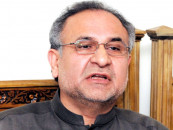Punjab’s HED stinks with corruption
Audit report reveals irregularities fall under two main clusters at HED

AGP revealed financial discrepancies of Rs11.1481 billion in Punjab’s HED PHOTO: FILE
The AGP’s audit report, a copy of which is available with The Express Tribune, has found irregularities in the sector in various transactions made during the fiscal year, including non-production of records, irregular retention and payment to officials having fake degrees or experience certificates, irregular payments without approval, violation of tenders, unauthorised appointments, unjustified payments in universities, irregular procurements against the PC-1, irregular establishment of sub-campus without jurisdiction, non-recovery of dues, losses due to inefficiency in project management and unauthorized bank accounts among other things.
The higher education sector of the Punjab accounts for 25.34% of the total financial irregularity in the province. The report revealed that the total loss to the national exchequer due to irregularities amount to Rs11.1481 billion, a 2% increase from last year. The Higher Education Department’s compliance with Public Accounts Committee (PAC) remained unsatisfactory and the department ought to improve it.
The largest sum reported by the audit in irregularities was non-production of records. It amounted to a total of Rs3.16403 billion. The report said that during the audit of HED, the auditable record relating to different transactions were not produced despite repeated requests.
Due to non-production of relevant record, the authenticity of the accounts could not be verified, the report said.
The audit report also pointed out that Bahuddin Zakariya University (BZU) Multan paid Rs50.5 million as salaries to admin officers. The report pointed out that the officials were appointed on the recommendation of selection committee but their testimonials were found fake during verification. They were charge sheeted and penalty of removal was recommended. The management failed to conduct a fair appointment process and in time verification. Moreover, no efforts were made to recover the pay and allowances irregularly paid. Other irregularities were also found at BZU Multan, including non-achievement of targets costing Rs2.6 billion, non-remission of 40% university share into the main account of the varsity valued at Rs161.01 million as well as opening a sub-campus in Lahore without jurisdiction.
The report said irregular appointments were made without advertisement in defiance of the Supreme Court ruling in the HED, resulting in the loss of Rs276.71 million to the national exchequer. Whereas, irregular appointments in violation of rules, regulations and statutes came with a cost of Rs21.31 million.
Another head details that the Board of Intermediate and Secondary Education (BISE) Multan and Gujranwala paid late sitting allowance to all their employees, resulting in the loss of Rs63.32 million.
Irregular payments were made to the Punjab Boards Committee of Chairmen (PBCC) and Inter Boards Committee of Chairmen (IBCC) amounting to Rs4.17 million, the violators include BISE Lahore, Sargodha and Multan.
Universities and colleges, under the Punjab HED were also unable to collect or fully recover public money in rents. The irregularities were found at University of Gujrat on three separate occasions, Government Post Graduate College for Women Samanabad Lahore, Government College for Women Gulberg Lahore, Government College University Faisalabad, Women University Multan, Government Emerson College Multan, Government Post Graduate Islamia College for Women Wahdat Colony Lahore and Government College Women University Faisalabad.
The report also found that the management of five institutions had been operating several unauthorized bank accounts. Government Post Graduate College Samanabad Lahore was found to have 23 bank accounts, Government Degree College (Boys) Dina Jhelum had 13, University of Education Lahore 15, government Degree College (Women) Dina Jhelum 19 and Government College Township Lahore operating 25 bank accounts.
The report notes that the HED had the final budget at the end of the fiscal year 2016 of Rs32.467 billion. Out of this, the report said, actual expenditure was Rs29.007 billion. However, contrary to the rules, the HED did not surrender the saving – the amount which could not be spent during the fiscal year. The savings amounted to Rs3.459 billion.
Recurring issues
The audit report revealed that the irregularities in the higher education sector fall under two main clusters, taking into view five year reports, irregular appointments along with arbitrary increases in pays and allowances; and non-adherence to the Public Procurement Rules (PPRs). Irregular appointments along with arbitrary increases in pays and allowances account for 89% of the total irregularities of the HED, whereas non-adherence to PPRs is 7% of the total.
The report also pointed out that most of the audit objections cropped up because of the difference of interpretations about the extent of financial autonomy enjoyed by universities and boards under their respective charters.
Audit tends to take a conservative view of the financial provisions of the concerned legislations. The auditees, on the other hand, like to interpret their financial autonomy in a broad and liberal manner.
The report suggested that PAC direct Public Account Officers (PAOs) take all stakeholders on board and determine the powers of various authorities in connection to recruitments and fixation of pays and allowances.
Furthermore, it also asks to determine the applicability of PPRs on boards and universities.
Published in The Express Tribune, February 19th, 2018.



1724319076-0/Untitled-design-(5)1724319076-0-208x130.webp)















COMMENTS
Comments are moderated and generally will be posted if they are on-topic and not abusive.
For more information, please see our Comments FAQ